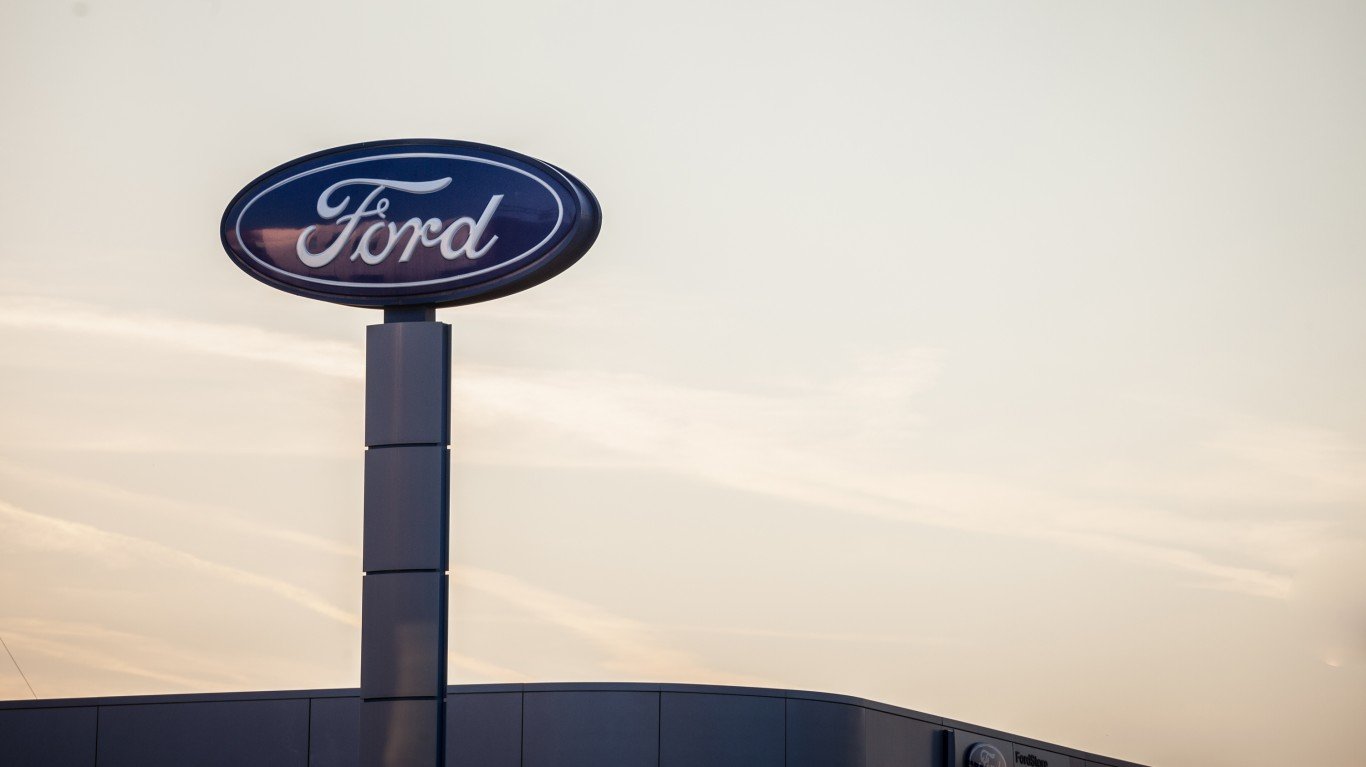

Ford Motor Co. (NYSE: F) is as close as any major U.S. manufacturer is to ruin. The trouble is reflected in Ford shares. Ford’s stock is off 45% in the last three months, which compares unfavorably with almost any other sector of the market.
The S&P 500 is down 13% for the same period. The Dow Jones industrial average is off 17%. The family of founder Henry Ford has its fortunes tied up in Ford stock. That puts them in real trouble because of their multi-decade reliance on the company’s financial performance.
The Ford family can’t afford to see the company implode, and with it the fortune they have enjoyed for over 100 years. Members of the family have run the company since it was founded.
Ford’s Brutal Earnings
Ford’s earnings for the January through March period were abysmal. Ford showed a $2 billion quarterly loss. It reported the loss as it claimed to be in the midst of a mediocre turnaround. The company announced specifically that “adjusted earnings before interest and taxes was negative $632 million, including estimated negative effect of at least $2 billion from coronavirus.” The coronavirus pandemic has hurt Ford and it only impacted a part of the quarter so far.
One bright spot was that Ford held 13.6% of the North America market in the quarter. That is better than any of the other geographic regions where Ford does business. It is in particular trouble in China where its market share is only 2.2%. China is the largest car market in the world.
Ford Credit was another bright spot for the period. It had $30 million in first-quarter earnings before taxes. However, that was down from $771 million in the same period a year ago.
The Future Is Worse
A billion dollar loss, or more, this quarter is in the short-term future. Ford suspended its guidance, so the number is a guess. However, the company said investors should expect second-quarter adjusted EBIT to be a loss of more than $5 billion. Balance sheet problems are even worse because the huge drop in sales around the world has started to drain Ford of cash.
Ford Family Still Controls Ford
The current executive chairman of Ford is William Clay Ford Jr., great grandson of founder Henry Ford. He has been chairman since 1999. He is so powerful that CEO Jim Hackett does not report to the board of directors. Hackett reports to him, a highly unusual set of circumstances for a major American company.
Two Henry Fords shaped the Ford Motor Company. Henry Ford founded the company in 1903 and ran it until he retired in 1945. He was one of the business titans of the first half of the 20th century, in a triumvirate that included Alexander Graham Bell and Thomas Edison. The man who made tires for Ford, Harvey Firestone, eventually joined the group as well.
Ford created the first automotive assembly line and built the wildly popular Model-T. The company worked its way through the Great Depression and became an arms manufacturer during WWII. At the end of the war, Ford’s grandson Henry Ford II took over. “Hank the Deuce” ran Ford until 1980, at which time he retired; he died shortly afterwards. He was at the helm when the company went public in 1955.
The Ford family controls the company via ownership of a special class of stock–B shares. The family claims that this structure is justified because it will take the long view of Ford’s affairs. Alternatively, many investors might make their decisions based on short-term earnings and rapid changes in the share price.
Edsel B. Ford II, William Clay Ford Jr., Benson Ford Jr., and Alfred B. Ford oversee the trust that holds these shares.
William Clay Ford Jr. is paid well to look after his family’s fortunes, although they have quickly fallen apart. He made $16.7 million in 2019, $13.9 million in 2018, and $15.6 million in 2017.
The senior members of the Ford family are listed with net worths of over $1 billion. A drop in stock price and loss of dividend undermine this.
Ford Family’s Biggest Problem Is CEO
William Clay Ford Jr. made a critical error recently. He appointed Hackett CEO in May 2017. Previously, Hackett had run the furniture company Steelcase.
Hackett’s job was to restructure Ford, cut costs, and move the company into self-driving and electric cars. Almost none of this has happened. The pandemic destroyed the very slim chance that the reinvention would work.
The Fords also expected Hackett to bolster the company’s core business, primarily by building Ford’s position in the U.S. and China, now the largest car market in the world.
Hackett eliminated most of the sedans sold in the U.S. in favor of SUVs, crossovers, and pick-ups. The pick-up business is critical to Ford’s success in America. Its full sized F-150 is the best-selling vehicle in America.
China has been a wreck for Ford. Its sales there are well behind those of most other major global car companies and dropped by double digits in 2019.
Ford Killers
Ford competes with over a dozen car companies globally — arguably, its critical rivals. Its larger competitor is General Motors Co. (NYSE: GM), which sells more cars in the U.S. by far. And it is the No. 2 car company, with its local affiliates, in China, after VW.
Ford is well behind the world’s top electric car company, Tesla Inc. (NASDAQ: TSLA). Hackett hopes to move Ford into direct competition with Elon Musk’s company, but Tesla is years ahead. Its market cap is several times that of Ford and owners of Tesla’s stock have been richly rewarded.
In the new age of the car industry, the Fords are getting poorer as the Musks become richer.
Sponsored: Attention Savvy Investors: Speak to 3 Financial Experts – FREE
Ever wanted an extra set of eyes on an investment you’re considering? Now you can speak with up to 3 financial experts in your area for FREE. By simply
clicking here you can begin to match with financial professionals who can help guide you through the financial decisions you’re making. And the best part? The first conversation with them is free.
Click here to match with up to 3 financial pros who would be excited to help you make financial decisions.
Thank you for reading! Have some feedback for us?
Contact the 24/7 Wall St. editorial team.



